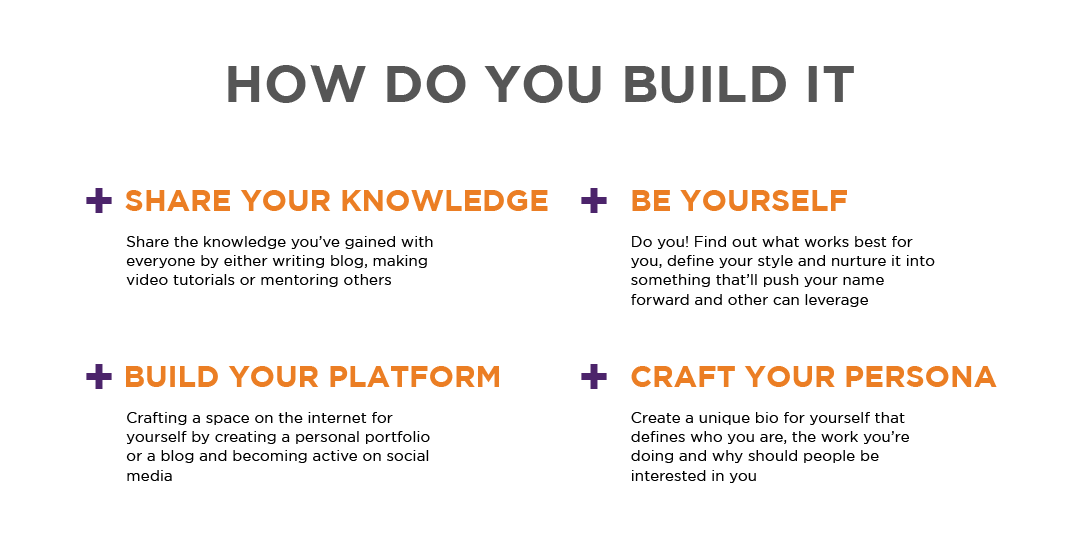What is Personal Branding?
You probably hear the word "branding" several times a day. It's become one of the most common subjects in entrepreneurship and for good reasons.
Personal branding refers to the process of establishing your public persona for your target audience.
Your personal brand is how you promote yourself. It is the unique combination of skills, experience, and personality that you want the world to see you.
You use your personal branding to differentiate yourself from other people.
In the pre-internet days, your personal brand was really just your business card. Unless you were high profile in the media or somebody who featured strongly as the face of advertising, few people would have heard of you. In today’s highly public world, where every little action is discussed at length on social media, you are far less anonymous.
Your personal brand helps you stand out from everybody else. You can use your personal brand to demonstrate your knowledge and skills about your areas of expertise. A personal brand is key to your professional success as it revolves around how you present yourself to existing and potential clients. It gives you the chance to emphasize your strengths and passions to help set you apart from everyone else and make sure that people see you in the way you want them to see you. It also helps people to feel as if they know you better which helps to increase your trustworthiness (even if they have not even met you in person).
Don’t forget the offline world. Your personal brand needs to encompass all the places where your customers could encounter you. Old-style business cards are just as crucial to your branding, as your social pages are.
The secret of successful personal branding is an underlying consistency. You are trying to establish an external depiction of “you.” This means that you need to act consistently with that depiction.

Why Personal Branding is Important?
Permission to be yourself
The personal branding process assures you that it’s okay to be yourself. If you’ve built your life on pretenses — on attempts to be someone you are not — this assurance is a huge relief. Personal branding is about expressing your authentic self by allowing you to be the person you are meant to be.
Gains in confidence
You develop confidence as you develop your personal brand. That confidence comes from looking at your strengths and knowing that you have many positive qualities to share. When you know that you have something of value to offer, your self-esteem soars. Your personal brand done well highlights your strengths and gives you a direction in which to use them.
As an added bonus, personal branding also minimizes your weaknesses. It’s human nature to want to improve your weaknesses, but by crafting your brand, you can determine whether you really need to use your weakest skills at all.
Building credibility
Your actions, which align with your brand, validate that you can be trusted and show that you are credible.
Showcasing your specialty
You need to specialize and have an area of expertise. When asked what you do best, your answer can’t be “everything.” No one knows what that means. To develop a specialty, the best place to start is with what you know.
What can you do that few others know how to do? What segment of the population do you understand better than most people in your field do?
You have a unique combination of work experience, life experience, and personal characteristics that create the foundation for determining your niche. To be known in a certain niche, you are wise to choose an area of expertise or market segment that you know well and that you enjoy.
Leaving your mark
Part of the branding process is becoming known for something. Your first step is to identify your best characteristics so that you know what to build on.
In a way, developing a personal brand is a means of ensuring that you leave a legacy. People will remember you through your actions, your expertise, and the emotional connections that you make.
But keep in mind that strong brands often repel as much as they attract; not everyone belongs in your target audience. Defining who you are means that you need to be brave enough to let your true self be visible.
Connection to your target audience
Personal branding success requires communicating your message to the right people — not necessarily to the entire world. And it requires communicating in a way that creates emotional connections with your target audience. You simply cannot build a solid brand without building relationships, which are based on emotional connections.
Building a strong personal brand helps you interact with your target audience in a clear, consistent way that quickly becomes familiar. That consistency builds trust in your target audience, which allows those emotional connections to form.
Distinguishing yourself from the competition
You are hardwired to notice what is different. You notice the person dressed in red in a sea of black clothing. Differentiation is crucial to your personal branding success.
If you are like everyone else in the market, you are a commodity, and you look the same to the customer as all the other options. If your target market discerns nothing special about you, it’s easy for the customer to pass you by.
The support you need
People genuinely want to help you. The problem is that if you are vague about what you need, no one is going to jump in and try to figure your life out for you (except perhaps your mother).
You need to be clear about who you are and what you need so that you can ask for support with clarity. If you know what you need, you know what to ask for. Defining your personal brand helps you determine your needs and identify who is most likely able to fulfill them.
Focusing your energy
You are probably as crazy busy as everyone else is. A benefit of having a personal brand is that when you have a clear understanding of who you are, what you do best, who you want to work with, and how you want to use your talents, you also know what you don’t want in your life.
Letting yourself be lazy
A personal brand helps you avoid the need to reinvent yourself and the tools you use in your professional life. After you pinpoint your expertise, your goal is to use it over and over so that you reap maximum benefits from it. (Perhaps you write an article that is then broken down into blog posts and later becomes the subject of a presentation to a professional association.)
The beauty of personal branding is that while it’s never static (you always want to learn and grow), it thrives on consistency. And consistency requires you to use key pieces of your branding puzzle again and again even as your personal brand evolves. So do your tough work up front and reap the rewards down the road. And remind yourself that it’s sometimes good to be lazy!

The Future of Personal Branding
Increase Consumer Trust
Currently, consumers are becoming increasingly wary of companies, preferring to put their faith in individuals instead. In fact, 42% of people distrust brands, as opposed to 92% of consumers who trust recommendations made by individuals, even people they don’t know. Furthermore, studies show that 82% of people are more likely to trust a company when its senior executives are active on social media, and 77% of consumers are more likely to make a purchase when the CEO of the business uses social media to define its values and mission. For those reasons, connecting to people on a personal level is incredibly important in building confidence in your message.
Stand Out From The Crowd
Furthermore, many industries are currently experiencing saturated marketplaces, which makes putting yourself in a strong position more important now than ever. In addition to having great products and services, intertwining your personal story with your company’s brand gives consumers another reason to trust and use your company. By aligning your personal passion with your business’s mission, you create an authentic experience for your audience, allowing them to share your passion and relate more deeply to you and your brand.
Increasing Your Career Flexibility
As you cultivate a brand around yourself within an industry, that industry will begin to value you based on who you are, rather than the projects you’re working on. For that reason, if you start a new venture, you’ll be able to find support more easily both from new team members and investors. This is because they’ll already be familiar with who you are and what your mission is, freeing you from the arduous process of selling yourself.
Furthermore, personal branding will help you get hired as well. In fact, one study found that 75% of hiring personnel are required to research potential candidates online. With that in mind, having a clear and composed online brand will help you make a great first impression before even going in for your first interview.

Tips for building a personal brand & boost your career
Figure out who you are
In order to build a personal brand that accurately reflects your personal and professional identity, you first need to know who you are. Be introspective, and create a list of your personal strengths and weaknesses. Ask yourself:
In which areas of work do I excel?
What motivates me?
What characteristics have others complimented me on?
Which projects have others had to help me with repeatedly?
Which roles seem to drain my energy?
Which projects can I spend hours on without feeling overwhelmed or tired?
If you’re struggling to answer these questions, ask friends, family, and co-workers how they would describe you. Once you’re more aware of the different facets of your personality, you can decide how best to brand them.
Keep in mind that many people struggle to choose a specific niche because they don’t want to limit themselves. Realize that your personal brand, like many corporate brands, will change as your career grows. The best strategy is to choose a particular area you’d like to focus on and let it evolve over time.
Determine what you want to be known for
Your personal brand is more than a reflection of who you are today; it’s a roadmap of where you to go. In addition to understanding your existing skills and competencies, Gresh suggests assessing your strengths and weaknesses as they relate to whichever industry or career you want to break into next.
By doing this, you’ll uncover the skills and traits that make you distinct, as well as the areas where you need to improve or gain new knowledge in order to advance. Forecasting where you want to be in five or 10 years—and the attributes you want to be known for—can help you better determine what steps you need to take in order to get there.
Define your audience
Before you start crafting your personal brand, you also need to determine who you’re trying to reach. Is it other industry thought leaders? An individual at a particular company? Recruiters? The sooner you define the audience, the easier it will be to craft your story, because you’ll better understand the type of story you need to tell (and where you need to tell it.)
Research your desired industry and follow the experts
In building a personal brand, your goal is to stand out—but you can’t rise to the top without taking inventory of who’s already there.
Embrace networking
As you cultivate your ideal personal brand, it’s important to network regularly (and effectively) to grow your professional circle. Connect with peers and industry thought-leaders by going to formal and informal networking events.

Personal Branding Agency
What we do:
Business, product or service name selection.
Developing a brand identity usage guidelines.
Brand messaging statements.
Brand marketing and promotion strategy.
Developing marketing collaterals.
Presentation design.
Customer persona development.




